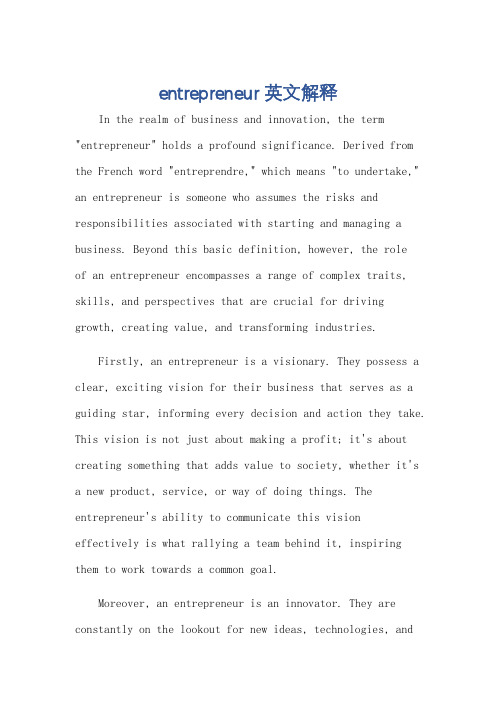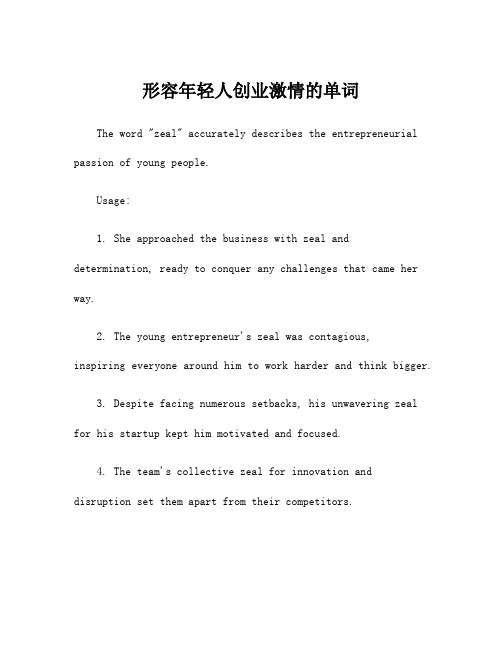Conceptualizing Corporate Entrepreneurship Strategy概念化公司创业战略
企业创新管理分析

廿二、创新型企业
〔一〕企业经营者关注,培育与治理企业不时变 迁着的“条件”。
资源 + 力量 = 条件
资源 力量
其他资源 资源
〔二〕创新障碍
创新障碍因素可分为: 经济因素 力量因素 其他因素
〔1〕、经济因素: 缺乏创新资金 创新风险大 创新本钱高 创新的回收期太长 创新收益不明显
位次 1 5
1
〔2〕、力量因素:
力量〔competences) 设计机器;整合不同功能 建立运筹体系,行销新观念 制造
禀赋〔Endowments) 规模;专利权;著作权; 地点;专业科学家 商举;赞助者;执照
学问(Knowledge)
创新的本质 渐进式;根本构造式;简单式;内隐性;生命周期阶段
环境〔Business Environment) 内部:策略;构造;系统人员;时机。
〔三、事业经营之效能与效率
高 目 标 愿 景 之 成 就
低
否
资源之利用
良
十六、提高创意的方法
尝试承受对事物的不同解释。 验证假设,不作过早的评估。 尽是扩大视野。 避开主观。 生疏可能性与不行能性之间的可转移性。
十七、创意思考的应用
新产品/效劳的开发。 新的经营理念。 新的市场开拓。 新的生产方式。 新的营销渠道。 新的工作流程。 新的工作方法。
十三、全球产业进展之创新类项取向
创新之议项
1、新素材 2、新生产技术 3、新治理方法 4、新货源 5、新市场
态 6、新组织架构
业〕之集群
进展趋势例如
微电子工业材料 新量产工法 时间与品质之治理 脱能源脱资源化 文化、价值、意识形
外部组织〔企业/产 化、策
十四、企业家创新时机
成功创业必备的六大品质英文版

成功创业必备的六大品质英文版Do You Have the Personality to Manage a Startup?你具备创业的品质吗?A while backwhen a startup founder mentioned to me that he wasn’t sure he had the personality to be anentrepreneurI realized how important that insight was. My first thought is that if you are more annoyed than energized by expert advice team suggestionsand customer inputthen you should probably avoid this line of work.前段时间,有个创业者向我提及,说他不确定自己是否具有成为企业家的品质,这让我意识到,领悟到这一点很重要。
我的第一反应是如果你觉得专家意见、团队建议、客户意见这些给你带来的烦恼多过激励,那么你真的应该躲开这条工作路线。
Actuallyit’s more plicated than thatbut that’s a good start. After working with entrepreneurs for almost a decade nowI have developed a good “radar” to quickly recognize mentalities that will likely pass the test of investorsemployeesand customers.实际情况远远没这么简单,不过这是一个好的开始。
经过与企业家一起工作了差不多有十年,现在的我给自己安装了一个“好雷达”,能够迅速判断出哪些品性有可能通过投资者、雇主和顾客的测试。
关于企业家精神的英语作文

关于企业家精神的英语作文English:Entrepreneurial spirit is the embodiment of creativity, innovation, resilience, and the willingness to take risks. It is the driving force behind the creation of new businesses, the development of new products and services, and the advancement of society as a whole. Entrepreneurial individuals are not afraid to challenge the status quo, to think outside the box, and to pursue their visions with determination and passion. They are constantly seeking opportunities, and are willing to adapt and pivot in the face of adversity. The entrepreneurial spirit is essential for economic growth, job creation, and the overall progress of a nation.中文翻译:企业家精神体现了创造力、创新、适应力和愿意承担风险的精神。
它是新业务创建、新产品和服务研发以及整个社会进步的推动力。
企业家个体并不害怕挑战现状,他们勇于打破常规思维,坚定地追求自己的目标。
他们不断寻求机会,愿意在逆境中适应和转变。
企业家精神对于经济增长、就业创造和一个国家的整体进步至关重要。
企业创新管理

(二)利润(Profit)
利润=收入-成本 (英) Peter Drucker:
“商业只有两种功能--市场和创新” Bill Gates:
“微软离破产永远只有18个月” Andrew S: Grove:
“10倍速的时代已经来临,我们的失败和成功都以10倍速 的节奏进行” “80%的危机和20%的机会” “只有偏执狂才能生存”
➢ 自主筹资 ➢ 融资 ➢ 自主经营 ➢ 自担风险 ➢ 自负盈亏
.
(1)制度条件
❖ 研究开发主体:
➢ 企业要有自己的研究机构 ➢ 合作研究
❖ 利益分配主体:
➢ 自由分配税后利润 ➢ 奖励有功人员
.
(2)企业家
创新的主角; 能审时度势,抓住企业发展机遇; 有效配置企业资源; 推动技术创新; 使企业利润最大化。 具备素质:
创新之议项
发展趋势示例
1、新素材 2、新生产技术 3、新管理方法 4、新货源 5、新市场 6、新组织架构
化、策略联盟、内部组织(经 理权/统理权)之开放。
微电子工业材料 新量产工法 时间与品质之管理 脱能源脱资源化 文化、价值、意识形态 外部组织(企业/产业)之集群
.
十四、企业家创新机会
(一)、拥有七大规律: 1、从意外情况中捕捉创新机会。 2、从实际与设想之间的不一致捕捉创新机会。 3、从过程中的需要中捕捉创新机会。
麦当劳: -把所有经理的椅子靠背锯掉;
肯德基 -用“特别顾客”监督分店;
惠普公司 -“敞开式大房间”办公室;
日本太阳工业公司 -公议成本分析制度
韩国精密机械株式会社 -“一日厂长制”
美国通用电气公司 -“全员决策”管理制度
Toyota -“动脑筋创新制度”
entrepreneur 英文解释

entrepreneur 英文解释In the realm of business and innovation, the term "entrepreneur" holds a profound significance. Derived from the French word "entreprendre," which means "to undertake," an entrepreneur is someone who assumes the risks and responsibilities associated with starting and managing a business. Beyond this basic definition, however, the roleof an entrepreneur encompasses a range of complex traits, skills, and perspectives that are crucial for driving growth, creating value, and transforming industries.Firstly, an entrepreneur is a visionary. They possess a clear, exciting vision for their business that serves as a guiding star, informing every decision and action they take. This vision is not just about making a profit; it's about creating something that adds value to society, whether it's a new product, service, or way of doing things. The entrepreneur's ability to communicate this visioneffectively is what rallying a team behind it, inspiring them to work towards a common goal.Moreover, an entrepreneur is an innovator. They are constantly on the lookout for new ideas, technologies, andtrends that can be leveraged to create a competitive advantage. This involves a willingness to experiment, to fail, and to learn from those failures. The entrepreneur's mindset is one of continuous improvement and adaptation, as they navigate the ever-changing landscape of business and markets.Additionally, an entrepreneur is a risk-taker. Starting a business is inherently risky, as it involves investing time, money, and personal resources into an uncertain future. The entrepreneur must be comfortable with this uncertainty, willing to make bold decisions, and preparedto pivot when necessary. This risk-taking attitude is balanced with a keen sense of calculation and strategy, ensuring that risks are taken intelligently and with the potential for significant reward.Furthermore, an entrepreneur is a leader. They are responsible for guiding their team, setting clear expectations, and fostering an environment that encourages creativity, collaboration, and accountability. The entrepreneur must be able to delegate effectively, trust their team, and recognize the value of diverse perspectives.By creating a culture of inclusivity and respect, they empower their team to reach their full potential and contribute to the success of the business.Finally, an entrepreneur is a learner. They understand that business is constantly evolving, and they are committed to staying abreast of new developments, trends, and technologies. This involves a willingness to seek feedback, embrace criticism, and continuously improve oneself. The entrepreneur's mindset is one of growth and continuous improvement, as they strive to become better leaders, innovators, and visionaries.In conclusion, the essence of entrepreneurship is much more than just starting a business. It's about having a clear vision, being innovative, risk-taking, leading effectively, and never stopping learning. These traits and skills are what truly define an entrepreneur and set them apart as agents of change and growth in our economy and society.**企业家精神的精髓:深入探索**在商业和创新领域,“企业家”一词具有深远的意义。
关于企业理念英文作文

关于企业理念英文作文Our company philosophy is simple: always put the customer first. We believe that by focusing on providing the best possible service and products to our customers, we can build long-lasting relationships and ensure their satisfaction.At our core, we value innovation and creativity. We encourage our employees to think outside the box, take risks, and come up with new ideas that can help us stay ahead of the competition. We believe that by fostering a culture of innovation, we can continue to grow and evolve as a company.Integrity is non-negotiable for us. We believe in doing the right thing, even when no one is watching. Honesty and transparency are key values that we uphold in all our interactions, both internally and externally. We believe that by acting with integrity, we can build trust and credibility with our customers and stakeholders.We are committed to giving back to the community. We believe that as a successful company, it is our responsibility to support and uplift those around us. Through various charitable initiatives and community service projects, we strive to make a positive impact and contribute to the well-being of society.Continuous improvement is ingrained in our company culture. We are always seeking ways to enhance our processes, products, and services. We believe that by constantly striving for excellence and learning from our mistakes, we can become stronger and more competitive in the market.。
诚实守信、开拓创新 为企业精神 英语

诚实守信、开拓创新为企业精神英语Navigating the intricate maze of modern business dynamics demands a delicate balance between two cardinal virtues: honesty and innovation. These pillars, intrinsic to the ethos of any enterprise, form the bedrock upon whichsuccess is constructed and reputations fortified. In the realm of commerce, where uncertainty looms large and change is the only constant, the fusion of integrity andcreativity serves as a compass, guiding organizations towards sustainable growth and enduring relevance.In the relentless pursuit of excellence, the principle of honesty stands as an unwavering sentinel, guarding against the pitfalls of deceit and deceitfulness. It is the moral compass that steers businesses away from the treacherous waters of unethical conduct, fostering trust amongst stakeholders and fortifying the foundation upon whichfruitful collaborations thrive. By upholding transparencyin dealings and honoring commitments, companies cultivate a reservoir of goodwill that transcends fleeting transactions, laying the groundwork for enduring partnerships andfostering a culture of mutual respect.However, honesty alone cannot propel an enterprise towards the echelons of success; it must be accompanied by thespirit of innovation, a force that propels organizations beyond the confines of conventionality into the realm of possibility. In today's hypercompetitive landscape, where obsolescence lurks at every corner, stagnation is not an option. Innovation breathes life into stagnant markets, propelling companies towards uncharted territories and transforming challenges into opportunities. It is the catalyst that ignites the flames of progress, driving organizations to reimagine the status quo and ushering in an era of unparalleled growth and prosperity.Embracing innovation necessitates a departure from the comfort of familiarity, beckoning enterprises to chart new horizons and challenge conventional wisdom. It demands a culture that celebrates experimentation and embracesfailure as an inevitable pitstop on the road to success. By fostering an environment where ideas are nurtured and creativity flourishes, businesses can unleash the fullpotential of their workforce, harnessing the collective genius to surmount even the most daunting of obstacles.The symbiotic relationship between honesty and innovation transcends mere profitability; it permeates every facet of organizational existence, shaping culture, and defining identity. Together, they form the cornerstone of a corporate philosophy that is as enduring as it is transformative. In the crucible of adversity, where challenges abound and uncertainties loom large, it is the unwavering commitment to these principles that distinguishes the resilient from the redundant, propelling enterprises towards a future limited only by the bounds of imagination.As the tides of change continue to sweep across the business landscape, one thing remains certain: the imperatives of honesty and innovation will continue to serve as guiding stars, illuminating the path forward for those daring enough to embrace their transformative power. In the crucible of competition, where fortunes are won and lost in the blink of an eye, it is not the size of thebalance sheet that determines success, but rather the steadfast adherence to principles that stand the test of time. In the pursuit of greatness, let honesty be the compass and innovation the wind in your sails, propelling you towards a future limited only by the bounds of imagination.。
形容年轻人创业激情的单词

形容年轻人创业激情的单词The word "zeal" accurately describes the entrepreneurial passion of young people.Usage:1. She approached the business with zeal and determination, ready to conquer any challenges that came her way.2. The young entrepreneur's zeal was contagious,inspiring everyone around him to work harder and think bigger.3. Despite facing numerous setbacks, his unwavering zeal for his startup kept him motivated and focused.4. The team's collective zeal for innovation anddisruption set them apart from their competitors.5. Their unwavering zeal for social impact led them to start a non-profit organization aimed at uplifting marginalized communities.6. The entrepreneur's zeal for constant learning and growth made him successful in an ever-evolving market.7. The young woman's zeal for sustainability led her to create an eco-friendly fashion brand that gained significant popularity.8. With an abundance of zeal, they launched their tech startup and quickly gained the attention of investors.9. His zeal for customer satisfaction was evident in the high-quality service his company provided.10. The team's relentless zeal for excellence earned thema reputation for being the best in their industry.11.年轻人创业热情满满,他们毫不畏惧地面对挑战。
- 1、下载文档前请自行甄别文档内容的完整性,平台不提供额外的编辑、内容补充、找答案等附加服务。
- 2、"仅部分预览"的文档,不可在线预览部分如存在完整性等问题,可反馈申请退款(可完整预览的文档不适用该条件!)。
- 3、如文档侵犯您的权益,请联系客服反馈,我们会尽快为您处理(人工客服工作时间:9:00-18:30)。
Conceptualizing CorporateEntrepreneurshipStrategy 本文对企业创业精神(CE)的认识一直在扩展,但是目前对于CE的认识还是处于一个碎片化与非累积的时期,因此本文就概念化CE为一个有用的关键点用来整合CE领域的一些关键要素。
CE战略模型包含CE战略的经历、CE战略的要素以及CE战略的成果。
所以本文就是构建了一个模型并且提出了模型中的16个假设或者议题。
一、背景及介绍全球竞争环境让现存企业纷纷采用创业战略(Entrepreneurship Strategy)作为一种通向成功的道路,通过采用创业战略,企业把自己放在了一种系统的有规律的去识别与发现身边的创业机会。
佐拉等人的研究表明现在存在探索不同的企业层级的创业精神概念化的需求了,而且学者认为创业战略对于人们来说代表着很多不同的事务,尝试去给战略贴上创业家精神的标签总是令人沮丧,而这种观点也得到了一系列研究的支持,学术界的这种不一致定义导致任何想要在企业中发布创业战略的人都感到困惑。
本文使用的模型并不是展示创业战略是如何介入或者接入组织的战略流程的,本文认为CE战略对企业实施战略的意图是持续有意的去发现创业机会以获得增长和竞争优势。
本文对CE战略的定义是远见指导的、组织范围的依赖创业行为来有目的的不断地使组织年轻,并且通过识别和发现创业机会来形成组织的范围。
本文的目的就是阐述模型的轮廓:CE战略最突出的要素以及要素之间的关系,个人和环境作为CE战略的前因变量,组织使用CE战略的成果。
本文的结构安排是首先阐述本文的模型与现存模型显著地差别是什么,其次是介绍模型的构成,提出模型构成变量之间的关系以及其与前因变量和成果之间的联系,最终对全文总结以及提出未来的研究方向。
二、现存的模型研究学术文献上有许许多多不同的模型,现存的主要模型已经在下图展示,本文所建立的模型与现存的模型有四点主要的差别:行为维度(the behavioral dimension),创业精神的轨迹(the locus of entrepreneurship),哲学上的调整(the philosophical justification),以及CE作为一个独特的可识别的战略(CE as a uniqueand identifiable strategy)。
Guth的模型阐述了一些CE现象的决定因素以及影响因素,但是在他们的模型的CE不是作为一个战略而是作为一个现象;Floyd的模型是关注在过程的,他们描述组织冒险和更新的行为是如何在组织内部出现的;Variations的模型把个人和组织的创业精神产出作为未来个人层面创业行为的决定因素;Covin的模型是与本文的模型最相近,他们把企业创业现象的前因和成果都放入了模型,而目前的模型与他们的差别体现在四点:一是概念化EO作为一个组织化的存在,二是通过特别的通过创业行为和过程的出现来定义组织的位置,三是明确的说明了CE战略的一个哲学构成,四是组织可以把创业家精神作为一个单独和明显的战略。
三、公司创业战略模型corporate entrepreneurship strategy本文认为公司创业战略模型是通过三个要素来体现的:一个创业战略的远见、一个有利于创业的组织体系以及创业过程及行为在公司的体系中得到展现,模型如下图,我们对CE战略的概念化使用了两个角度,分别是战略作为一种远景(perspective)以及战略作为一种模式(pattern)。
作为一种远景是被当做模型的战略远见,作为一种模式则是被当成了模型里面的创业过程和行为,而体系则是作为远见与模式相连的导管。
四、前因(Antecedents)及提出假设1.个体的创新认知与创业的战略眼光个体的创新认知是人们用来评估、判断以及做决策所使用到的知识结构,在本模型中它包含个人对创业的信仰、态度和价值观;战略眼光代表被表达成组织哲学运作方式的创新和创业过程,所以一个战略眼光就是高层管理者绘制他们希望未来成为一个什么样的组织的机制。
本文模型的一个前提假设是高层管理者对创业支持的意识是创业战略眼光出现的必须条件,由此我们得到的一个议题如下:议题一:高层管理者对创业支持的意识强度与创业战略眼光的出现呈正相关关系。
2.个体的创新认知与支持创业的组织体系创业支持的意识并不仅仅单独存在与高层管理者中,组织中的管理者与非管理者都是影响他的因素,因为他们代表着的是企业的文化。
议题二:组织成员对创业精神支持的意识强度与文化规范支持的创业行为正相关。
3.个体的创新认知与创业的行为和过程创业行为可以通过特殊的活动来表现,识别和探索到机会的存在是创业行为的必要条件,同时也是创业行为的过程。
议题三:组织成员对创业行为支持意识的强度是与个人发现与识别到创业机会的可能性呈正相关关系。
4.外界环境条件与创业的战略眼光特殊的环境条件会促进感知到的CE战略的需求,学者认为比较大的环境复杂性、动态性以及异质性会对CE战略产生需要,本文是认为创业战略需求与三种环境条件息息相关:竞争强度、技术变化以及产品市场进化。
还存在着一些其他的环境条件对其产生影响,但是通过大量的实证和学术的研究表明这三个是最重要的。
在高强度的竞争条件、快速变化的技术以及产品市场的进化条件下,企业高层领导着更容易去采纳一个CE战略。
当然并非所有的企业在遇到这三个条件的时候都会采用CE战略,所以本文形成下面的三个假设:议题四:竞争强度、技术变化以及产品市场变化的强度与在高层管理者中出现创业战略是正相关的;议题五:竞争强度、技术变化以及产品市场变动的强度在高层管理者存在较高的创业支持意识而个体存在较低的创业支持意识的情况下与创业战略的出现更加的正相关。
5.外界环境条件与创业的行为和过程组织成员对创业支持的意识会促进他们意识到创业的机会,而前文已经阐述过竞争强度、技术变化以及产品市场的变化会有益于创业机会的出现,所以这些环境条件也与组织成员的机会识别非常相关,所以形成下面的四个假设:议题六:竞争强度、技术变化以及产品市场的变化与组织成员意识到创业机会的可能性正相关。
议题七:当组织成员具有比较强的支持创业意识的时候,竞争强度、技术变化以及产品市场的变化与组织成员意识到创业机会的可能性更加正相关。
议题八:竞争强度、技术变化以及产品市场的变化与组织成员利用到创业机会的可能性正相关。
议题九:当组织成员具有比较强的支持创业意识的时候,竞争强度、技术变化以及产品市场的变化与组织成员利用创业机会的可能性更加正相关。
五、模型要素及提出假设1.创业战略眼光与对创业支持的组织体系当CE战略实施的时候,高层管理者需要对促进创业行为负责,而他们满足这种责任的方式就是发展与确立创业战略眼光,高层管理者需要建立一种体系保证组织可以在没有高层管理者的参与之下保持自发的创业行为。
在企业创业战略眼光之下,组织的结构、文化、资源与系统这些组织的体系必须具有一些特质。
结构是组织对权利、交流以及工作流程关系的一种安排,目前已经有很多的与创新相关的组织研究,但是最重要的还是组织的有机性;文化是影响组织创业行为的一个重要的因素,而高层管理者的语言与行动都会影响到组织的文化,因此高层管理者在创业创业战略的角度上的行为和语言都会鼓励企业创业的精神;资源代表着企业拥有什么,当资源的结合能够使自制完成什么任务的时候他就变成了一种能力,识别和利用创业的机会需要组织拥有不同的资源;奖励机制会对组织创业行为有直接的立刻的影响,尤其是奖励机制是否股利勇于冒险与创新对组织创业行为的倾向有非常大的影响。
总体来看提出如下的议题:议题十:高层管理者表现出来的创业创新眼光与结构组织性程度、文化影响创业行为的强度、组织创业能力以及组织奖励机制鼓励创业行为的程度呈正相关。
2.创业战略眼光与创业的过程与行为创业战略眼光当创业的过程的机会识别与利用通过企业得以发生的时候就实现了,创业战略眼光对创业行为与过程有直接的影响,研究认为当高层管理者阐述了战略眼光之后,成员就会在创业行为上得到指导与鼓励。
因此形成如下议题:议题十一:创业战略眼光的存在与组织成员意识与利用创业机会的可能性呈正相关关系。
3.支持创业的组织体系与创业的过程与行为组织成员内部的支持创业意识将会促使成员意识与探索创业的机会,但是他需要正确的组织体系来支持与加固创业的机会,没有有组织的结构和强烈的创业家能力以及奖励系统的支持,系统的识别与利用创业机会将不会发生,无论成员的支持创业意识有多么的强烈。
所以得到如下两个假设:议题十二:组织结构的有机性、组织的创业家能力、文化影响强度以及奖励系统对创业行为的鼓励与成员意识到创业机会的可能性呈正相关。
议题十三:组织结构的有机性、组织的创业家能力、文化影响强度以及奖励系统对创业行为的鼓励与成员利用到创业机会的可能性呈正相关。
六、模型产出及提出假设1.创业活动和行为与CE战略产出创业行为导致各种各样的个体和组织层面的产出,个体和组织层面评估产出以及它导致的成本和机会成本,个体可以从创业行为中获取知识和技能,组织也可以通过实施CE战略来学习和发展能力。
通过创业行为实施CE战略可以把企业放置在一个新的位置、改变领域的属性、把企业定位在一个新的产品市场。
因此我们提出新的假设:议题十四:创业机会的利用与企业竞争能力的强度以及战略的重新定位具有正相关关系。
2.竞争能力与支持创业的组织体系竞争能力的改变会通过他们对组织体系的影响而直接影响到未来的CE战略的实施,尤其是一个企业的竞争能力不可避免的会与创业能力构成的组织体系相关,这些表明竞争能力与创业者能力总是被同时建立起来的。
由此提出议题:议题十五:组织竞争能力的强度与支持创业的组织体系的程度呈正相关关系。
3.战略重定位与外部环境条件战略的重新定位会通过变更外部环境条件来间接地影响CE战略,对战略重定位影响的理解可以通过思考战略重定位到底对企业做了什么或者为企业做了什么。
战略重定位作为利用外部创业机会实现的结果,代表了竞争版图的改变,由此提出最后一个议题。
议题十六:组织战略重定位的实现与竞争强度、技术改变以及产品市场的改变有相关关系。
七、贡献1.对CE部分文献研究的贡献首先是本文对CE战略的概念化提出了独特的界定,对以前模糊不清的、混乱的、碎片化的概念定义做出了贡献;其次本文论证了CE是被当做一个战略来运行的,是必须在组织内部深入发展的;第三本文把CE模型里面的要素紧紧地联系在了一起,并研究了他们之间的关系。
最后本文发现CE战略的一个关键弱点是缺乏稳健性。
2.调查和实践的贡献首先是模型阐述了要素之间不同配对以及全体之间的协调性是CE战略得以成功的必要条件;第二是给那些对这个概念感兴趣的企业提供了指导与一个初始的理解;第三是指出公司如果想要成功的实施CE战略,那么他的一些基础性的活动也应该与一个成功的战略的基础活动相联系;八、研究局限和未来研究局限:研究缺乏实证性检验,仅仅提出了一个复杂的模型未来研究:对本模型中所提出的假设进行实证研究检验;构建出可以准确衡量企业实施CE战略的程度;研究CE战略的实施对企业会有什么负面的影响。
